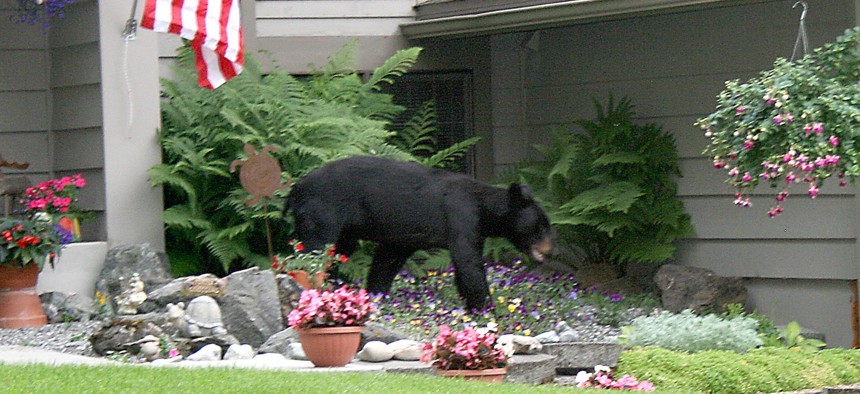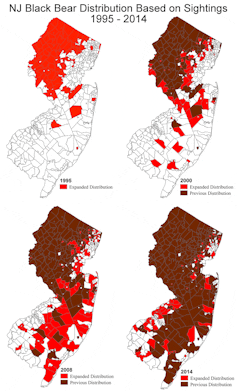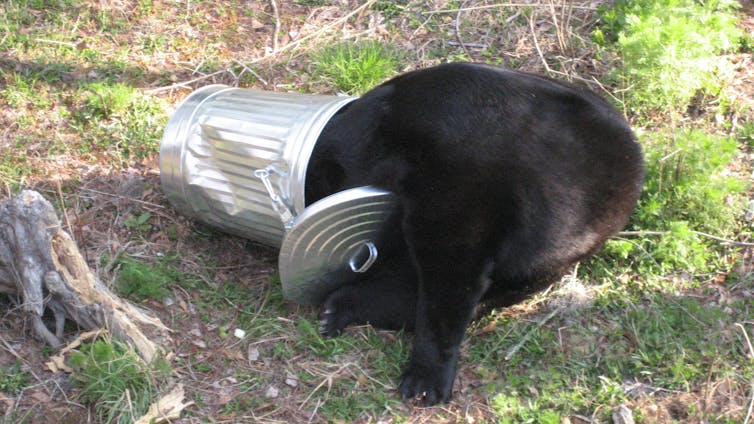Black Bears Adapt to Life Near Humans By Burning the Midnight Oil

A black bear wanders through a east Anchorage, Alaska, neighborhood on July 17, 2007. AP Photo/ Mark Thiessen

Connecting state and local government leaders
COMMENTARY | Some animal populations are growing. An estimated 1 million black bears now roam from Mexico to Canada and Alaska.
Amid reports that human activities are pushing many wild species to the edge of extinction, it’s easy to miss the fact that some animal populations are expanding. Across North America, a number of species that were reduced by overhunting and loss of forested habitat in the 1800s are rebounding. This sometimes results in wildlife living near populated areas.
In a recent study, my colleagues and I analyzed one of these comeback species: American black bears (Ursus americanus). In the early 1900s, black bears were relegated to more wild parts of North America. Today, thanks to regulated hunting and forest regrowth, they have returned to about 75% of their historic North American range. An estimated 1 million black bears now roam from Mexico to Canada and Alaska.

In Massachusetts, where we worked, black bears have expanded from a small isolated population in the Berkshire Mountains to an estimated 4,500 bears across the state. Massachusetts is the third-most densely populated state in the nation, and human development is expanding, sometimes putting bears and people in close proximity to one another.
Other scholars have found that bears shift their behavior from natural areas to human-dominated ones in years when natural foods are scarce. My co-authors and I wanted to know how bears in Massachusetts were behaving around people and human activity. We found that in spring and fall, bears were altering their natural daily rhythms to move through human-developed areas at night.
A Nose for Human Food
Why would black bears use populated areas? They are omnivorous opportunists with a good sense of smell, and can sniff out calorie-rich foods that often are found in developed areas, such as bird seed, pet food, garbage and even agricultural crops. These foods may be especially attractive to bears before and after hibernation, when the animals are living solely off stored body fat.
Before hibernation in the fall, bears enter a metabolic state called hyperphagia—literally, excessive eating—in which they consume 15,000 to 20,000 calories a day. That’s roughly equivalent to eight large cheese pizzas or five gallons of chocolate ice cream.

During hibernation bears can lose up to one-third of their body weight. And after they emerge from their dens in springtime, natural foods are typically scarce until plants start to leaf out and flower.
Black bears’ energy requirements during these phases can drive their behavior. We examined data from 76 black bear GPS collars across central and western Massachusetts. As expected, the bears we tracked moved around more in daytime than at night, and avoided humans and developed areas during the day. However, we also found that in spring and fall, when the bears had increased caloric demands, they altered their natural daily rhythms to move through human-developed areas at night.
Balancing Rewards and Risk
Our findings and existing knowledge about black bears’ seasonal energetic demands indicate that bears may be operating in a “landscape of fear” – a conceptual model that ecologists originally developed in studies of prey species such as elk. Viewed through this framework, an individual animal’s behavior is the result of a cost-benefit analysis that trades off food reward against risk. For black bears, the reward is high-calorie supplemental food and the risk is encounters with humans.
In spring when natural foods are scarce, and in fall when bears need to gain weight for hibernation, the attraction of food rewards outweighs the associated risks. Still, bears try to mitigate this risk as much as possible by altering their natural activity patterns to visit developed areas at night, when human activity is lowest.
In summer, when natural foods are more abundant and bears are least metabolically stressed, we did not observe these behavioral changes. Bears avoided developed areas at all times of day.

A Wild Bear Becomes Suburbanized
The story was more nuanced when we considered individual bears. We developed movement models for each of our collared bears, and found that their responses to some landscape features varied.
For example, we found some bears avoided human development less than others. These bears lived in more populated areas, with densities in their territories of at least 190 houses per square mile (75 houses per square kilometer). Planners classify such areas as country suburbs or early suburbanization.
Our findings indicate that black bears can adjust from living in more natural areas to living in areas with some human development. Factors such as the distribution of bears in an area and the availability of open territories may affect their willingness to settle near humans.
Getting Along With the Neighbors
Our observation of black bears acclimating to developed areas and becoming more nocturnal echoes a wider trend observed among wildlife worldwide. Wild animals are increasing their nocturnal activity in response to development and other human activities, such as hiking, biking and farming. Understanding how, when and why these nocturnal shifts occur can help prevent wildlife-human conflict and keep both people and animals safe.
For example, most human-bear conflict arises from people inadvertently making calorie-rich foods, like bird seed, garbage and pet food, available to bears. Knowing that bears seek out these foods more often at night and in areas with certain housing densities can help managers educate people in avoiding conflict. And people who are scared of bears may be comforted to know that most of the time, black bears are just as scared of them.
Kathy Zeller is a postdoctoral researcher in environmental conservation at the University of Massachusetts at Amherst.
This article is republished from The Conversation under a Creative Commons license. Read the original article.

NEXT STORY: Republicans File Lawsuit to Stop New Redistricting Commission




